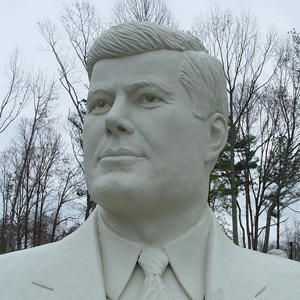President John F. Kennedy
JFK
John Fitzgerald Kennedy and Civil Rights
During the Civil Rights Movement President John Fitzgerald Kennedy helped the African-Americans many times. JFK at first hesitated because he needed the Southern vote for his re-election. JFK started to help when he and the rest of the country watched the television coverage of African-Americans being attacked by white police officers while peacefully protesting. After seeing this crisis, JFK and the rest of the country wanted to change. Although JFK wanted to change, there were obstacles in his way.
After JFK became president he used executive orders to get what he wanted accomplished. JFK appointed many African-Americans to high-level positions in his administration, created the Committee on Equal Employment Opportunities, and banned racial discrimination in federally funded housing. The Committee on Equal Employment Opportunities brought lawsuits against schools in the South that did not integrate. JFK had to use executive orders because the Southern Democrats in Congress supported segregation.
In the South, King was leading the Civil Rights Movement. He organized non-violent protests against segregation in Birmingham, Alabama. In this city he relied on Eugene “Bull” Connor (the police chief) to make a fool out of himself trying to keep segregation alive. Connor was known to be stupid as well as fighting against desegregation. When African-Americans peacefully protested, Connor would order his police officers to attack without mercy. They would beat the protesters with clubs and let dogs attack as well. The protestors would not fight back. King encouraged school children to protest. Connor would order mass arrests and high powered fire hoses would also be used against the children. JFK was reluctant to act because he was afraid that protests would make it harder to convince members of Congress who did not agree with him to create a civil rights bill.
After witnessing this on T.V., JFK had to act. He sent thousands of troops to an Alabama airbase. JFK also sent a comprehensive civil rights bill to Congress. Just before he introduced the bill he spoke to the country. His “Civil Rights Speech” was on June 11, 1963. This address was trying to persuade Americans to desegregate schools, movie theaters, restaurants, and any public accommodations. JFK said:
“One hundred years of delay have passed since President Lincoln freed the slaves, yet their heirs, their grandsons, are not fully free. They are not yet freed from the bonds of injustice, they are not yet freed from social and economic oppression. And this nation, for all its hopes and its boasts, will not be fully free until all its citizens are free.”
John F. Kennedy Civil Rights Speech June 11, 1963
The Civil Rights Bill that JFK sent to Congress would do three things.
1. Give all citizens access to all public accommodations.
2. Challenged (did not make illegal) denial of black voting rights
3. Gave federal government authority in school desegregation matters.
JFK unfortunately did not see this bill pass. He was assassinated before this bill was signed into law in 1964.
King also led a type of protest called a freedom ride. In these protests people would get in a group and travel to the South in a bus. They would try to desegregate interstate bus terminals. JFK was reluctant to help the freedom riders at first, but eventually he changed his mind. Attorney General Robert Kennedy convinced the Interstate Commerce Commission to prohibit interstate bus and train companies from using segregated facilities. He also sent 400 federal marshals to protect the freedom riders.
After King was done with Birmingham, Alabama he moved on to Selma, Alabama. There he was targeting Governor George Wallace over school segregation. Governor Wallace was a pro-segregationist and preached “Segregation now, Segregation tomorrow, and Segregation forever.” The Southern white crowd roared and applauded after this speech. JFK federalized the Alabama National Guard to protect African-American students who were trying to register at the University of Alabama.
In the state of Mississippi, an African-American by the name of James Meredith wanted to register at Ole Miss (University of Mississippi). He was turned away four times personally by the Governor of Mississippi, George Barnett. JFK called the governor and told him he had a plan to register Meredith quietly. JFK called the National Guard and federal marshals and ordered them to the campus. At the campus there was a riot. Two people were killed and many others were injured. Meredith registered and became the first African-American to go to the University of Mississippi.
JFK had a hard time dealing with the Civil Rights Movement. Some of the Southerners fought hard to keep segregation alive. JFK provided protection for the peaceful protestors by sending federal marshals and mobilizing the National Guard. JFK arranged King to be released from jail. JFK also gave executive orders that allowed African-Americans to have more rights and more opportunities. The most important contribution JFK made for civil rights was sending the Civil Rights Bill to Congress. JFK was a great leader because he stood up for the African-Americans when many white leaders did not.
